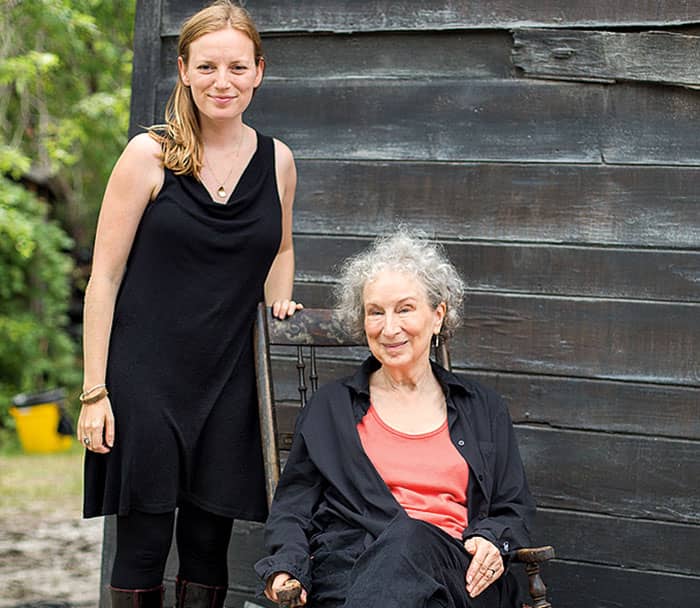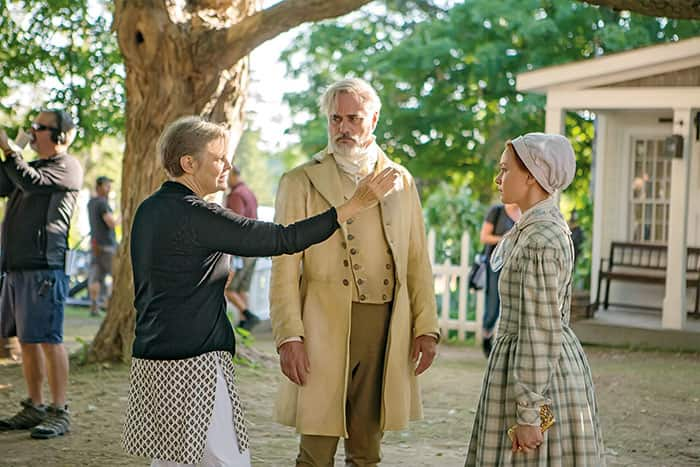Culture & Entertainment
Why we can’t wait to binge on the TV adaptation of "Alias Grace”

CBC
Culture & Entertainment
Why we can’t wait to binge on the TV adaptation of "Alias Grace”
Already binge-watched The Handmaid's Tale? Thankfully, 2017 offers another Margaret Atwood production to enjoy with the CBC adaptation of her classic Alias Grace. Here, executive producer and writer Sarah Polley and director Mary Harron speak about this peak in Canadian TV.
Alias Grace opens on the face of its heroine, a convicted murderer. After 15 years of incarceration, Grace Marks is now frog-marched to the prison governor's mansion every day, where she spends her afternoons cleaning. Grace pauses during her work, wide eyes filling the screen, as her voice-over ticks off the personas that people impose on her: Is she a heartless killer? An innocent betrayed? Her face slips from sly to serene to stern. With this, the miniseries—adapted from Margaret Atwood's 1996 work of historical fiction set in Kingston, Ont., itself based on the true story of an immigrant maid convicted in 1843 of killing her employer and his mistress—announces that it will crack open the complexity and cruelty of women's lives just as skilfully as Atwood's beloved novel.
The seminal text is in very good hands. Accomplished director and actor Sarah Polley has been hustling to get this miniseries made for the past two decades—ever since her agent gave her the book when she was 17. Though Polley failed to secure the rights back then, she got them when she turned 30, and now, eight years later, Alias Grace is finally hitting the screen, airing on CBC Sept. 25 and heading to Netflix Canada in 2018.

Sarah Polley, who wrote the script adaptation of Alias Grace, poses with Margaret Atwood, the book's author.
Polley called on director Mary Harron (of American Psycho fame) to helm all six episodes. Harron, too, was inculcated with Atwood from an early age; she discovered the author in college when she found that her older sister and her friends were reading The Edible Woman. "[Atwood's work] had a big effect on us. In the '70s, we were discovering feminism, so I came of age with those books," says Harron. "They had an impact on me."
Polley is also an Atwood fan, and was determined to do justice to the writer's nuanced characters. "She's able to capture the inner workings and motivations of people in a way that's piercing and all-seeing," says Polley. "She gives readers X-ray vision into her characters' minds."

Sarah Gadon as Grace Marks. Image by: CBC
That's why Polley wove so much of the book's original dialogue into the script. Next, she looked homeward for True North talent, such as Sarah Gadon (as Grace Marks), Anna Paquin and Paul Gross (who play Grace's victims) and even David Cronenberg, who cameos at the beginning as the reverend who calls upon Dr. Jordan, a dashing young doctor (played by BBC babe Edward Holcroft of Wolf Hall), to assess if Grace is a good candidate for release after a decade and a half in prison.
The series switches between Grace and Dr. Jordan's tension-filled meetings in the governor's fancy manse and flashbacks of Grace's life leading up to the crime. There's her stomach-churning boat journey to Canada from Ireland, during which her mother is one of the many to perish in the fetid conditions below deck, scenes truly grotesque in their conjuring of a heaving, claustrophobic nightmare. There's Grace's desperate scrabble to support her siblings after her father proves not only useless but also abusive, forcing her to grind out a living as a near-indentured servant to a succession of wealthy families. "If The Handmaid's Tale looks ahead to what life could be for women, Alias Grace looks back at what it was for women," says Polley.
The show has an eerie grey undertone, as if shot through a piece of muslin; it's the perfect hue for the crushing monotony and hard labour of Grace's life as an Irish immigrant in 1859 Canada, an existence that Polley and Harron showcase in contrasting interiors: the servants' spare quarters and the dusty settlements look even more stark against the extravagant chintz-crammed drawing rooms of the wealthy that Grace cleans and cleans.
Her gender and poverty afford her little choice in career—or much else. "The women are all trapped, upper class and lower," says Harron. "Everyone's stuck in their roles; there are very few opportunities in that society." Perhaps, stranded in the wilds of mud-splattered colonial Kingston, murder is Grace's only way to assert any control at all.

Director Mary Harron on set with Paul Gross and Sarah Gadon. Image by: CBC
Nineteenth-century Kingston is the latest location to star in Polley's films. Setting is a frequent character in her work, from the stark Ontario winterscape of Away From Her to Toronto's lush summer nights in Take This Waltz. This, she says, is how her Canadian-ness manifests itself most in her films. "A sense of place has been really important to me, as well as capturing the specific nature of my experience of being here," she says.
"Marks's court case was really the O.J. Simpson trial of its time," says Polley, pointing out that the different ways Grace was viewed during the sensational trial was informed by the political furor of the day, à la how opinions on Simpson's guilt often hinged on race and class. In Grace's case, the English gentry wanted to see her hang, while her fellow poor Scots and Irish believed she was innocent. She escaped the death sentence, but she then descended into the hellscape of what Harron describes as colonial Canada's "very, very harsh penal system." Polley and Harron don't flinch in portraying the tortures she underwent, as Grace not only suffers sexual assault and beatings but must also deal with constant flashbacks to her traumas, the audience shaking along with her at the jagged memories of struggling at the hands of predatory guards.

Anna Paquin as Nancy Montgomery and Paul Gross as Thomas Kinnear. Image by: CBC
Polley and Harron were determined to reveal in Alias Grace the grimmest details of colonial women's lives, whether it was enduring the terrors of immigration or the pain of an illegal abortion. "That was very conscious," Harron says, recalling filming the scene where Grace discovers the gory aftermath of her friend's back-parlour procedure. "We wanted to show what went on. It's not going to be an idealized version." Star Sarah Gadon even once gleefully imitated Harron on set, crying, "More blood! We need more blood!" Alias Grace serves as an important reminder of how recent it was in Canada "that women were chattel and completely disposable, and where violence was a completely normal part of everyday life," says Polley. "And it still is for many women in many parts of the world."
There are some small moments of joy in the miniseries, however, especially when female friends wrest a few seconds of empowerment from an existence almost entirely controlled by men, whether it's tossing apple peels over their shoulders to foretell the initials of their future love or walking arm in arm to the abortionist. Between these tiny triumphs and everything Grace Marks endures, Alias Grace paints Grace's life in full and also a rich portrait of womanhood itself. "Often, when I read Margaret Atwood or hear her speak, I find myself thinking, Thank God she said that, as if I could have said the same thing," says Rebecca Liddiard, who plays Grace's best friend, the spirited servant Mary. "But I'm no writer or renegade—most of us aren't—and so I take comfort in Atwood's voice, which is always steadfast, intelligent, female, contentious, colourful. I trust her as a spokesperson for me as a Canadian woman in the larger world."















Comments